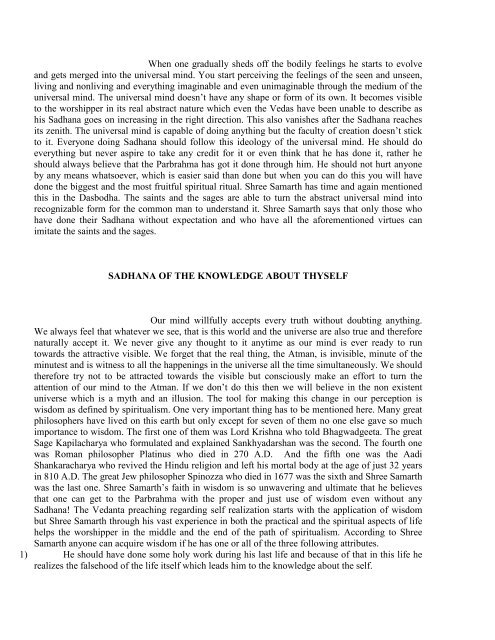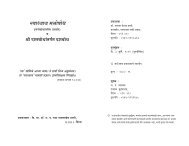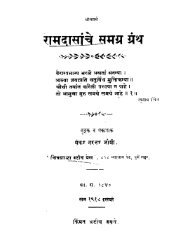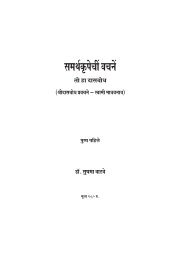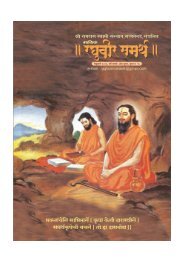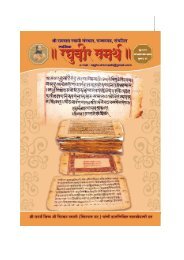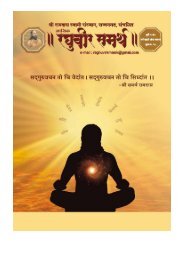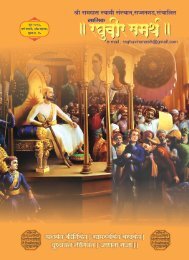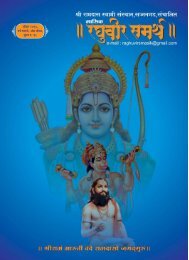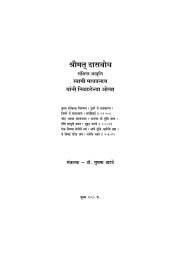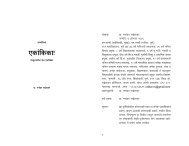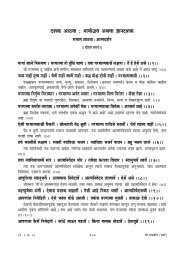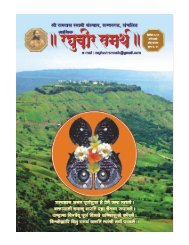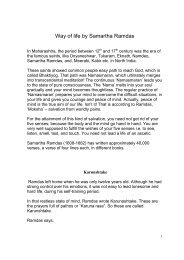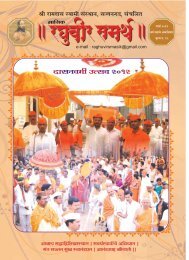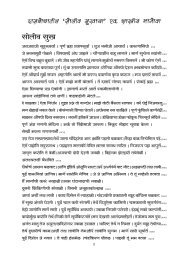THE DASBODHA BY: SADGURU SHREE SAMARTH RAMDAS ...
THE DASBODHA BY: SADGURU SHREE SAMARTH RAMDAS ...
THE DASBODHA BY: SADGURU SHREE SAMARTH RAMDAS ...
Create successful ePaper yourself
Turn your PDF publications into a flip-book with our unique Google optimized e-Paper software.
When one gradually sheds off the bodily feelings he starts to evolve<br />
and gets merged into the universal mind. You start perceiving the feelings of the seen and unseen,<br />
living and nonliving and everything imaginable and even unimaginable through the medium of the<br />
universal mind. The universal mind doesn’t have any shape or form of its own. It becomes visible<br />
to the worshipper in its real abstract nature which even the Vedas have been unable to describe as<br />
his Sadhana goes on increasing in the right direction. This also vanishes after the Sadhana reaches<br />
its zenith. The universal mind is capable of doing anything but the faculty of creation doesn’t stick<br />
to it. Everyone doing Sadhana should follow this ideology of the universal mind. He should do<br />
everything but never aspire to take any credit for it or even think that he has done it, rather he<br />
should always believe that the Parbrahma has got it done through him. He should not hurt anyone<br />
by any means whatsoever, which is easier said than done but when you can do this you will have<br />
done the biggest and the most fruitful spiritual ritual. Shree Samarth has time and again mentioned<br />
this in the Dasbodha. The saints and the sages are able to turn the abstract universal mind into<br />
recognizable form for the common man to understand it. Shree Samarth says that only those who<br />
have done their Sadhana without expectation and who have all the aforementioned virtues can<br />
imitate the saints and the sages.<br />
SADHANA OF <strong>THE</strong> KNOWLEDGE ABOUT THYSELF<br />
Our mind willfully accepts every truth without doubting anything.<br />
We always feel that whatever we see, that is this world and the universe are also true and therefore<br />
naturally accept it. We never give any thought to it anytime as our mind is ever ready to run<br />
towards the attractive visible. We forget that the real thing, the Atman, is invisible, minute of the<br />
minutest and is witness to all the happenings in the universe all the time simultaneously. We should<br />
therefore try not to be attracted towards the visible but consciously make an effort to turn the<br />
attention of our mind to the Atman. If we don’t do this then we will believe in the non existent<br />
universe which is a myth and an illusion. The tool for making this change in our perception is<br />
wisdom as defined by spiritualism. One very important thing has to be mentioned here. Many great<br />
philosophers have lived on this earth but only except for seven of them no one else gave so much<br />
importance to wisdom. The first one of them was Lord Krishna who told Bhagwadgeeta. The great<br />
Sage Kapilacharya who formulated and explained Sankhyadarshan was the second. The fourth one<br />
was Roman philosopher Platinus who died in 270 A.D. And the fifth one was the Aadi<br />
Shankaracharya who revived the Hindu religion and left his mortal body at the age of just 32 years<br />
in 810 A.D. The great Jew philosopher Spinozza who died in 1677 was the sixth and Shree Samarth<br />
was the last one. Shree Samarth’s faith in wisdom is so unwavering and ultimate that he believes<br />
that one can get to the Parbrahma with the proper and just use of wisdom even without any<br />
Sadhana! The Vedanta preaching regarding self realization starts with the application of wisdom<br />
but Shree Samarth through his vast experience in both the practical and the spiritual aspects of life<br />
helps the worshipper in the middle and the end of the path of spiritualism. According to Shree<br />
Samarth anyone can acquire wisdom if he has one or all of the three following attributes.<br />
1) He should have done some holy work during his last life and because of that in this life he<br />
realizes the falsehood of the life itself which leads him to the knowledge about the self.


